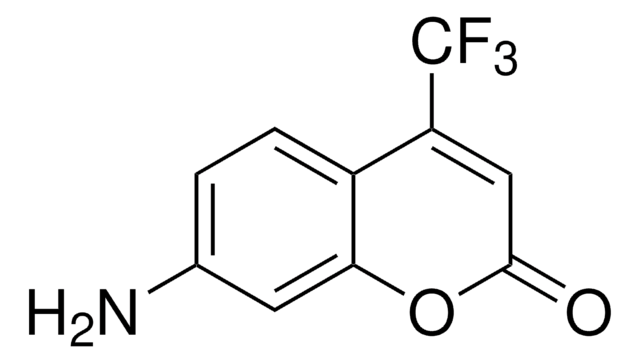546186
Coumarin 153
Dye content 99 %
Sinónimos:
2,3,6,7-Tetrahydro-9-(trifluoromethyl)-1H,5H,11H-[1]benzopyrano(6,7,8-ij)quinolizin-11-one, 2,3,6,7-Tetrahydro-9-trifluoromethyl-1H,5H-quinolizino(9,1-gh)coumarin, 8-Trifluoromethyl-2,3,5,6-4H-1,H-11-oxa-3a-aza-benzo[de]anthracen-10-one, Coumarin 540A
About This Item
Productos recomendados
form
solid
Quality Level
composition
Dye content, 99%
mp
164-168 °C (lit.)
λmax
422 nm (lit.)
422 nm
fluorescence
λem 532 nm in ethanol (Lasing peak 550 nm, lasing range 521 - 605 nm (methanol), pump source XeCl (308 nm))
SMILES string
FC(F)(F)C1=CC(=O)Oc2c3CCCN4CCCc(cc12)c34
InChI
1S/C16H14F3NO2/c17-16(18,19)12-8-13(21)22-15-10-4-2-6-20-5-1-3-9(14(10)20)7-11(12)15/h7-8H,1-6H2
InChI key
VSSSHNJONFTXHS-UHFFFAOYSA-N
¿Está buscando productos similares? Visita Guía de comparación de productos
Application
Storage Class
11 - Combustible Solids
wgk_germany
WGK 3
flash_point_f
Not applicable
flash_point_c
Not applicable
ppe
Eyeshields, Gloves, type N95 (US)
Certificados de análisis (COA)
Busque Certificados de análisis (COA) introduciendo el número de lote del producto. Los números de lote se encuentran en la etiqueta del producto después de las palabras «Lot» o «Batch»
¿Ya tiene este producto?
Encuentre la documentación para los productos que ha comprado recientemente en la Biblioteca de documentos.
Los clientes también vieron
Artículos
Dye-sensitized solar cells (DSCs) are 3rd generation solar cells combining the promise of high efficiency with low production costs.
While dye sensitization as the basis for color photography has been accepted for a very long time,1 attempts to use this principle for the conversion of solar light to electricity generally had resulted only in very low photocurrents, below 100 nA/cm
Nuestro equipo de científicos tiene experiencia en todas las áreas de investigación: Ciencias de la vida, Ciencia de los materiales, Síntesis química, Cromatografía, Analítica y muchas otras.
Póngase en contacto con el Servicio técnico








